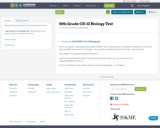
10th grade biology aligned to the standards that is free.
- Subject:
- Life Science
- Material Type:
- Full Course
- Date Added:
- 05/13/2015


10th grade biology aligned to the standards that is free.
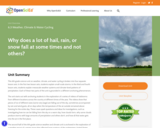
The goals of OpenSciEd are to ensure any science teacher, anywhere, can access and download freely available, high quality, locally adaptable full-course materials. REMOTE LEARNING GUIDE FOR THIS UNIT NOW AVAILABLE!
This unit on weather, climate, and water cycling is broken into four separate lesson sets. In the first two lesson sets, students explain small-scale storms. In the third and fourth lesson sets, students explain mesoscale weather systems and climate-level patterns of precipitation. Each of these two parts of the unit is grounded in a different anchoring phenomenon.
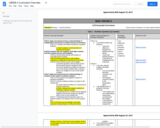
6th Grade Regular Math: Course Scope & Sequence.
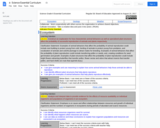
6th Grade Regular Science Scope & Sequence
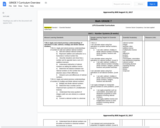
7th Grade Regular Math: Course Scope & Sequence.
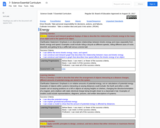
7th Grade Regular Science Scope & Sequence
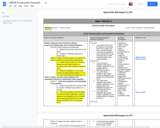
8th Grade Regular Math: Course Scope & Sequence.
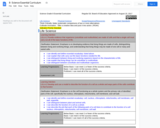
8th Grade Regular Science Scope & Sequence
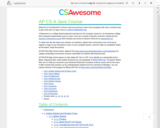
CSAwesome is a free College Board endorsed curriculum for AP Computer Science A, an introductory college-level computer programming course in Java
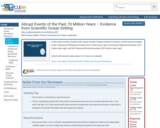
In this 6-part activity, students learn about climate change during the Cenozoic and the abrupt changes at the Cretaceous/Paleogene boundary (65.5 million years ago), the Eocene/Oligocene boundary (33.9 million years ago), and the Paleocene/Eocene boundary (55.8 million years ago).
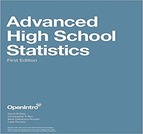
This textbook is part of the OpenIntro Statistics series and offers complete coverage of the high school AP Statistics curriculum. Real data and plenty of inline examples and exercises make this an engaging and readable book. Links to lecture slides, video overviews, calculator tutorials, and video solutions to selected end of chapter exercises make this an ideal choice for any high school or Community College teacher. In fact, Portland Community College recently adopted this textbook for its Introductory Statistics course, and it estimates that this will save their students $250,000 per year. Find out more at: openintro.org/ahss
View our video tutorials here:
openintro.org/casio
openintro.org/TI
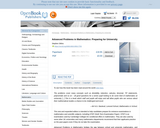
This new and expanded edition is intended to help candidates prepare for entrance examinations in mathematics and scientific subjects, including STEP (Sixth Term Examination Paper). STEP is an examination used by Cambridge Colleges for conditional offers in mathematics. They are also used by some other UK universities and many mathematics departments recommend that their applicants practice on the past papers even if they do not take the examination.
Advanced Problems in Mathematics bridges the gap between school and university mathematics, and prepares students for an undergraduate mathematics course. The questions analysed in this book are all based on past STEP questions and each question is followed by a comment and a full solution. The comments direct the reader’s attention to key points and put the question in its true mathematical context. The solutions point students to the methodology required to address advanced mathematical problems critically and independently.
This book is a must read for any student wishing to apply to scientific subjects at university level and for anyone interested in advanced mathematics.
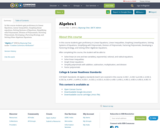
In this course students gain proficiency in Linear Equations, Linear Inequalities, Graphing linear equations, Solving Systems of Equations, Simplifying with Polynomials, Division of Polynomials, Factoring Polynomials, Developing a Factoring Strategy, and Solving Other Algebraic Equations.
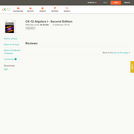
A work in progress, CK-12's Algebra I Second Edition is a clear presentation of algebra for the high school student. Topics include: Equations and Functions, Real Numbers, Equations of Lines, Solving Systems of Equations and Quadratic Equations.
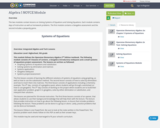
The two modules contain lessons on Solving Systems of Equations and Solving Equations. Each module contains days of instruction as well as homework problems. The first module contains a Geogebra assessment and the second includes a Jeopardy game.
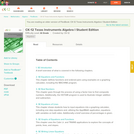
CK-12's Texas Instruments Algebra I Student Edition Flexbook allows students to better utilize a graphing calculator in understanding the fundamental concepts of algebra.
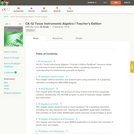
CK-12's Texas Instruments Algebra I Teacher's Edition Flexbook allows an Instructor to teach students to better utilize a graphing calculator in understanding the fundamental concepts of algebra.
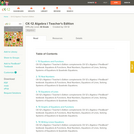
CK-12 Foundation's Algebra I Teacher's Edition FlexBook complements CK-12's Algebra I Student Edition. The solution and assessment guides are available upon request.
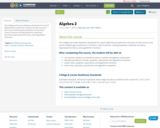
The College and Career Readiness Standards for Level E (High School) outline the outcomes for this course.In this course students gain proficiency in Functions, Linear Functions, Solving Quadratics, Quadratic Functions, Exponential Functions, and Logarithmic Functions.
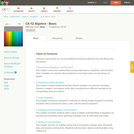
CK-12 Foundation's Basic Algebra FlexBook is an introduction to the algebraic topics of functions, equations, and graphs for middle-school and high-school students.